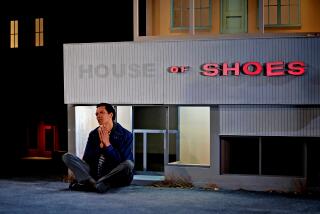Review: Sex, consent, gender, race: A potent cocktail in âActuallyâ
He said, she said. Then he said more, and then she said more. They both kept saying things. But no matter how much they said, it was impossible to determine what had actually happened between the two freshmen in the Princeton University dorm room when they were very drunk. Was it consensual sex or rape?
In a nutshell, thatâs Anna Zieglerâs new play âActually,â having its world premiere at the Geffen Playhouse in a co-production with the Williamstown Theatre Festival.
Tackling an issue as topical and thorny as consent on college campuses suggests a writer who doesnât fear, or even enjoys, poking a hornetâs nest. David Mametâs âOleanna,â which provoked heated discourse about gender politics and student/professor power imbalances in the 1990s, is an obvious precedent. Zieglerâs parties are both students, but Ziegler one-ups Mamet by adding race to the provocations on offer: The accuser, Amber (Samantha Ressler), is white and Jewish; the defendant, Tom (Jerry MacKinnon), is black.
But unlike Mamet, who fueled fires by making both characters in âOleannaâ behave in unsavory ways, Ziegler sets out to portray Amber and Tom as likable. Because Tom is an accused rapist, she has to work a bit harder on his behalf. Amber may have levied the accusation, but she also pursued Tom avidly into bed and entertains romantic fantasies about him even at the disciplinary hearing. Tom may have ignored Amberâs voice at a critical moment, but otherwise heâs an unusually sensitive guy. Both, itâs implied, are really victims here, of a culture that relies on packs of unsupervised, ill-informed, intoxicated teenagers to establish its sexual ethics. (The descriptions of campus social life are likely to make parents cancel their tuition checks: âAfter 7, you have to go out and drink till youâre sick,â Amber explains casually.) You can almost feel Ziegler dealing her cards into scrupulously even piles, careful never to stack the deck too high in either direction.
If ultimately this setup feels a bit rigged, the minute-to-minute game-play in this production, tautly directed by Tyne Rafaeli, is gripping. The action takes place entirely inside a plain wooden box, like a giant diorama (by scenic designer Tim Mackabee), bare except for two chairs, where Tom and Amber are displayed like museum specimens. Sitting side by side, they only occasionally speak to or even look at each other; for the most part, each addresses the audience directly, guilelessly, like a trusted friend.
Both actors excel at conveying their charactersâ doubts and illusions about themselves, so that our sympathy keeps ping-ponging between them as they describe the paths that brought them together. Insecure, lonely Amber insists that she only got into Princeton because she was competing against other mediocre female squash players. Like Zosia Mametâs character, Shoshanna, on HBOâs âGirls,â sheâs a chatterbox prone to âuptalk,â babbling out a continual word salad of incongruous references and startling propositions: Jews and blacks are alike, she contends, in both ânever wanting to go campingâ and âthe deep and unending fear that any moment weâll be rounded up and killed.â
Tom comes from an inner-city school, where a teacher saved his life by introducing him to the piano. Talented and good-looking, in his first two months of college he has had his pick of sexual partners and the only reason he asks âmousyâ Amber out at all is that he feels sorry for her. But he doesnât easily warm to her and often finds her irritating, as when she assumes that he got into Princeton because heâs black. âThatâs not a micro-aggression,â she defends herself. âNo, because itâs, like, a macro-aggression,â Tom counters.
The play works so hard to make romance between these two implausible that when they do get together, the machinery starts to rattle. Although the characters are beautifully rendered and complex, their behavior on the night in question remains difficult to credit. Also, a quibble: the descriptions of Princeton feel a little generic (In real life Ziegler attended Yale); more specific references might enhance the authenticity. But if âActuallyâ doesnât entirely succeed as a story, itâs a beautifully acted character study destined to trigger discussions about a problem that, despite decades of argument, isnât getting better.
⌠⌠⌠⌠⌠⌠⌠⌠⌠âŚ
âActuallyâ
Where: Audrey Skirball Kenis Theatre at the Geffen Playhouse, 10886 Le Conte Ave., Los Angeles
When: 8 p.m. Tuesdays-Fridays, 3 and 8 p.m. Saturdays, 2 and 7 p.m. Sundays. Ends June 11
Tickets: $60-$82
Info: (310) 208-5454 or www.geffenplayhouse.org
Running time: 1 hour, 30 minutes
Support coverage of the arts. Share this article.
YOU MIGHT ALSO LIKE ...
Diary of a world premiere: Join playwright Rajiv Joseph as the curtain rises on âArchdukeâ
A criticâs take on the Tony nominations: Kudos for rewarding inventive shows
These teachers waited in line nearly 24 hours to be first for âHamiltonâ L.A. tickets
More to Read
The biggest entertainment stories
Get our big stories about Hollywood, film, television, music, arts, culture and more right in your inbox as soon as they publish.
You may occasionally receive promotional content from the Los Angeles Times.










